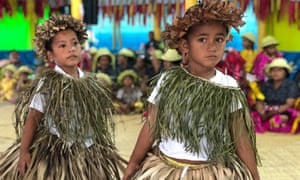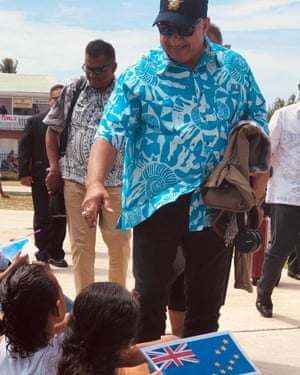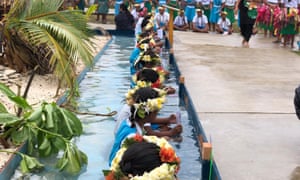Extract from The Guardian
Climate crisis is more than a meeting agenda item in a host country that could be left uninhabitable by rising sea levels
As the leaders of Pacific countries step off their planes at Funafuti airport this week for the Pacific Islands Forum,
they are being met by the children of Tuvalu, who sit submerged in
water, in a moat built around the model of an island, singing: “Save
Tuvalu, save the world.”
The welcome sets the tone for a Pacific Islands Forum meeting that will not only have climate change at the top of the agenda – as it has been for many years – but is being hosted by a country that the UN says is one of the most vulnerable to rising sea levels, which could render it uninhabitable in the coming century.
Apart from the important symbolism, Tuvalu’s hosting of the event presents considerable logistical challenges for the nation, as more than a dozen world leaders and an estimated 600 people will descend upon the country with a population of just 11,000.
Tuvalu, which is roughly three hours north of Fiji, is also grappling with an ongoing outbreak of dengue fever, the fact it has no supply of safe fresh water, and the fact that it is designated by the UN as a least-developed country.
There are only three commercial flights a week to Tuvalu, so most
attendees have had to fly in on chartered military planes and roughly
75% of all the accommodation that is being used for the forum has been
constructed for the event.The welcome sets the tone for a Pacific Islands Forum meeting that will not only have climate change at the top of the agenda – as it has been for many years – but is being hosted by a country that the UN says is one of the most vulnerable to rising sea levels, which could render it uninhabitable in the coming century.
Apart from the important symbolism, Tuvalu’s hosting of the event presents considerable logistical challenges for the nation, as more than a dozen world leaders and an estimated 600 people will descend upon the country with a population of just 11,000.
Tuvalu, which is roughly three hours north of Fiji, is also grappling with an ongoing outbreak of dengue fever, the fact it has no supply of safe fresh water, and the fact that it is designated by the UN as a least-developed country.
Pacific leaders, including the Australian prime minister, Scott Morrison, and the New Zealand prime minister, Jacinda Ardern, who both arrive on Wednesday, will be staying in bungalows. Other delegates and officials are being housed in grey two-storey demountable buildings along the length of the island’s airport runway, which runs almost the entire length of the island and as the largest plot of land also gets used for football games, drying clothes and for people to sleep on.
“Tuvalu taking on this task, it’s mammoth – everything won’t be perfect, but it will be [done] with the warmth and generosity of island people,” Dame Meg Taylor, the general secretary of the PIF, said on Sunday in Funafuti. “I think Tuvalu has been courageous to host this meeting,” she said.
The Tuvaluan prime minister, Enele Sopoaga, told Guardian Australia that hosting the conference, which officially begins on Tuesday, was an opportunity the country could not pass up.
“The people of Tuvalu are very, very strong, they are very firm that they want to protect and save their island and their people and their way of life and their resources,” said Sopoaga. “So they are looking at the forum as an opportunity to showcase their resilience.”
Morrison is likely to come under pressure from leaders of Pacific island nations, who have repeatedly criticised Australia for what they see as insufficient action to address the climate crisis.

“If our friend Australia does not show them any regard, any respect, it is a different thing, we cannot be partner with that thinking. I certainly hope we do not come to that juncture to say we cannot go on talking about partnerships regardless of whether it is [the Australian government’s Pacific] Step-Up or [New Zealand’s Pacific] Reset, while you keep pouring your coal emissions into the atmosphere that is killing my people and drowning my people into the water.”
Another key issue that may see Australia on opposing sides to its Pacific neighbours is that of human rights abuses in West Papua. A delegation from West Papua, including the Papuan independence leader Benny Wenda, was due to attend the forum as part of the Vanuatu government’s delegation, but as of Sunday afternoon the West Papuan group had not been able to arrive in Tuvalu, with both Sopoaga and Taylor saying they knew nothing about the delegation’s difficulties in reaching the country.
Australia is strongly supportive of Indonesian sovereignty over Papua, while the independence movement has widespread support among several key Pacific island nations – particularly Melanesian neighbours Vanuatu and the Solomon Islands.

Bainimarama presided over the UN’s leading climate change body in 2017, COP23, and is a high-profile global figure in the fight against global heating and will lend strength to other Pacific leaders such as Sopoaga and the Marshall Islands president, Hilda Heine, who are also key Pacific figures in this debate.
China’s battle for influence in the Pacific region is also likely to emerge as a key theme during discussions. Tuvalu is one of a handful of countries in the world – several of which are located in the Pacific – that have diplomatic relations with Taiwan, rather than mainland China, which is not a member of PIF but will send a delegation as a dialogue partner.
The PIF secretariat will likely be looking to make sure there is not a repeat of last year’s events, when the Chinese delegation walked out of one of the talks during the PIF meeting in Nauru, which also has diplomatic relations with Taiwan.
China’s presence in the region also might mean Australia finds itself with far less leverage than it once did, says the Australia-based Pacific analyst Tess Newton Cain.
“This is the first time that I can remember that Australia hasn’t been able to play the money card, and say: ‘what if we took our aid money away? What if we didn’t pay for that?’” she says. “Fiji and Vanuatu would say ‘well do what you like, I’m off to Beijing next week’.”
Because of Australia’s potentially reduced leverage in the region and the increasing gulf between Australia and its Pacific neighbours on climate change, the meeting is likely to throw into relief questions about the identity of the Pacific Islands Forum, the region and Australia’s place in it.
“From what I can see, I don’t see that Morrison has a mandate to give Pacific leaders what they say they want,” said Newton Cain.
“It wasn’t long ago that Australia was saying they wanted to be a leader in this region,” she said. “They don’t say that anymore, the question is, do they even want to be on the team, is there even a place for them on the team, not to mention the captain of the team?”

No comments:
Post a Comment